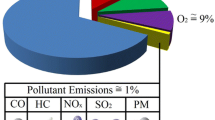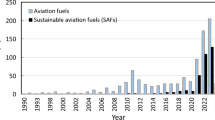Abstract
Emissions from vessels are a major environmental concern because of their impacts on the deterioration of the environment, especially global warming of the atmosphere. Therefore, the International Maritime Organization (IMO) concerns significant care to environmental protection through the reduction of exhaust emission and improvement of energy efficiency through technical and operational measures. Among the suggested measures from IMO, the alternative fuel such as natural gas has the priority to be used instead of fossil fuels. The present paper calculates the effect of using natural gas in a dual-fuel engine from environmental and energy efficiency perspectives. As a case study, a container ship has been investigated. The results of the analysis show that the percent of CO2, NOx, and SOx emission reduction corresponding to using a dual-fuel engine operated by natural gas instead of a diesel engine operated by heavy fuel oil is about 30.4%, 85.3%, and 97%, respectively. Moreover, it found that NOx and SOx emission rates of the dual-fuel engine comply with the IMO 2016 and 2020 limits, respectively. Furthermore, the Energy Efficiency Design Index value in the case of using dual-fuel engine is lower than the value by using diesel engine by about 30%, and this value will be 77.18%, 86.84%, and 99.27% of the required value for the first, second, and third phases, respectively, as recommended by IMO.










Similar content being viewed by others
Data availability
The datasets used and analyzed during the current study are available from the corresponding author on reasonable request.
Abbreviations
- AE:
-
Auxiliary engine
- CSR:
-
Continuous service rating
- CO2 :
-
Carbon dioxide
- DF:
-
Dual fuel
- DWT:
-
Deadweight
- EEDI:
-
Energy Efficiency Design Index
- EEOI:
-
Energy Efficiency Operational Indicator
- CEAS:
-
Computerized Engine Application System
- GHG:
-
Greenhouse gas
- HFO:
-
Heavy fuel oil
- IMO:
-
International Maritime Organization
- IPCC:
-
Intergovernmental Panel on Climate Change
- ISO:
-
International Organization for Standardization
- ITTC:
-
International Towing Tank Conference
- LNG:
-
Liquefied natural gas
- MARPOL:
-
International Convention for the Prevention of Pollution from Ships
- MCR:
-
Maximum continuous rating
- MDO:
-
Marine diesel oil
- ME:
-
Main engine
- MEPC:
-
Marine Environment Protection Committee
- ME-GI:
-
Main engine gas injection
- NG:
-
Natural gas
- NOx:
-
Nitrogen oxides
- PM:
-
Particulate matter
- SFC:
-
Specific fuel consumption
- SG:
-
Shaft generator
- SOx:
-
Sulfur oxides
- TEU:
-
Twenty-foot equivalent unit
References
Agrawal H, Malloy QGJ, Welch WA, Wayne Miller J, Cocker DR III (2008) In-use gaseous and particulate matter emissions from a modern ocean going container vessel. Atmos Environ 42:5504–5510. https://doi.org/10.1016/j.atmosenv.2008.02.053
American Bureau of Shipping (2014) Ship Energy Efficiency Measures Advisory 74
Ammar NR (2018) Energy- and cost-efficiency analysis of greenhouse gas emission reduction using slow steaming of ships: case study RO-RO cargo vessel. Ships Offshore Struct 13:868–876. https://doi.org/10.1080/17445302.2018.1470920
Ammar NR (2019) An environmental and economic analysis of methanol fuel for a cellular container ship. Transp Res Part D Transp Environ 69:66–76. https://doi.org/10.1016/j.trd.2019.02.001
Ammar NR, Seddiek IS (2017) Eco-environmental analysis of ship emission control methods: case study RO-RO cargo vessel. Ocean Eng 137:166–173. https://doi.org/10.1016/j.oceaneng.2017.03.052
Ammar NR, Seddiek IS (2020a) Enhancing energy efficiency for new generations of containerized shipping. Ocean Eng 215:107887. https://doi.org/10.1016/j.oceaneng.2020.107887
Ammar NR, Seddiek IS (2020b) An environmental and economic analysis of emission reduction strategies for container ships with emphasis on the improved energy efficiency indexes. Environ Sci Pollut Res 27:23342–23355. https://doi.org/10.1007/s11356-020-08861-7
Ammar NR, Elgohary MM, Zeid A, Elkafas AG (2019) Prediction of shallow water resistance for a new ship model using CFD simulation: case study container barge. Journal of Ship Production and Design 35:198–206. https://doi.org/10.5957/JSPD.11170051
Ančić I, Šestan A (2015) Influence of the required EEDI reduction factor on the CO2 emission from bulk carriers. Energy Policy 84:107–116. https://doi.org/10.1016/j.enpol.2015.04.031
Banawan AA, El-Gohary MM, Sadek IS (2010a) Environmental and economical benefits of changing from marine diesel oil to natural-gas fuel for short-voyage high-power passenger ships. J Eng Marit Environ 224:103–113
Banawan AA, El Gohary MM, Sadek IS (2010b) Environmental and economical benefits of changing from marine diesel oil to natural-gas fuel for short-voyage high-power passenger ships. Proc Inst Mech Eng Part M J Eng Marit Environ 224:103–113. https://doi.org/10.1243/14750902JEME181
Bellaby P, Upham P, Flynn R, Ricci M (2016) Unfamiliar fuel: how the UK public views the infrastructure required to supply hydrogen for road transport. Int J Hydrog Energy 41:6534–6543
Bengtsson S, Andersson K, Fridell E (2011) A comparative life cycle assessment of marine fuels liquefied natural gas. J Eng Marit Environ 225:97–110
Bøckmann E, Steen S (2016) Calculation of EEDIweather for a general cargo vessel. Ocean Eng 122:68–73. https://doi.org/10.1016/j.oceaneng.2016.06.007
Bouman EA, Lindstad E, Rialland AI, Strømman AH (2017) State-of-the-art technologies, measures, and potential for reducing GHG emissions from shipping – a review. Transp Res Part D Transp Environ 52:408–421. https://doi.org/10.1016/j.trd.2017.03.022
Burel F, Taccani R, Zuliani N (2013) Improving sustainability of maritime transport through utilization of liquefied natural gas (LNG) for propulsion. Energy 57:412–420
Cooper D, Gustafsson T (2004) Methodology for calculating emissions from ships: update of emission factors. Swedish Meteorol Hydrol Inst
El Gohary MM, Ammar NR, Seddiek IS (2015) Steam and sofc based reforming options of pem fuel cells for marine applications. Brodogradnja 66:61–76
Elgohary MM, Seddiek IS, Salem AM (2015) Overview of alternative fuels with emphasis on the potential of liquefied natural gas as future marine fuel. Proc Inst Mech Eng Part M J Eng Marit Environ 229:365–375. https://doi.org/10.1177/1475090214522778
Elkafas AG, Elgohary MM, Zeid AE (2019) Numerical study on the hydrodynamic drag force of a container ship model. Alexandria Eng J 58:849–859. https://doi.org/10.1016/j.aej.2019.07.004
Elkafas AG, Elgohary MM, Shouman MR (2021) Numerical analysis of economic and environmental benefits of marine fuel conversion from diesel oil to natural gas for container ships. Environ Sci Pollut Res 28:15210–15222. https://doi.org/10.1007/s11356-020-11639-6
Elma K, Bengtsson EF, Karin EA (2014) Fuels for short sea shipping: a comparative assessment with focus on environmental impact. J Eng Marit Environ 228:44–54
EPA (2000) Analysis of commercial marine vessel emissions and fuel consumption data. Energy Environ Anal Inc
Fleetmoon (2020) RIO GRANDE EXPRESS. https://www.fleetmon.com/vessels/rio-grande-express_9301823_43889/. Accessed 20 Nov 2020
Germanischer, Lloyd (2013) Guidelines for determination of the energy efficiency design index
Hapag, L (2019) Hapag Lloyd in numbers. https://www.hapag-lloyd.com/en/about-us.html. Accessed 4 Dec 2019
ICF (2009) Current methodologies in preparing mobile source port-related emission inventories. US Environ Prot Agency
IMO (2011) Resolution MEPC.203(62) “Amendments to the Annex of the Protocol of 1997 to amend the International Convention for the Prevention of Pollution from Ships, 1973, as modified by the Protocol of 1978”
IMO (2013) Resolution MEPC.231(65): 2013 Guidelines for calculation of reference lines for use with the energy efficiency design index (EEDI)
IMO (2018) MEPC 308(73): 2018 guidelines on the method of calculation of the attained Energy Efficiency Design Index (EEDI) for new ships. London
IPCC (2018a) Summary for Policymakers. Global Warming of 1.5°C. In: An IPCC Special Report on the impacts of global warming
IPCC (2018b) Climate Change 2018: The Physical Science Basis. Contribution of Working Group I to the fifth Assessment Report of the Intergovernmental Panel on Climate Change. Cambridge University Press, UK
Kasper A, Aufdenblatten S, Forss A, Mohr M, Burtscher H (2007) Particulate emissions from a low-speed marine diesel engine. Aerosol Sci Technol 41:24–32. https://doi.org/10.1080/02786820601055392
Kesieme U, Pazouki K, Murphy A, Chrysanthou A (2019) Biofuel as an alternative shipping fuel: technological, environmental and economic assessment. Sustain Energy Fuels 3:899–909. https://doi.org/10.1039/C8SE00466H
Kolwzan K, Narewski M, Statkow PR (2012) Study on alternative fuels for marine applications. Clean Shipp Curr 3:1–43
Liu S, Papanikolaou A, Zaraphonitis G (2011) Prediction of added resistance of ships in waves. Ocean Eng 38:641–650. https://doi.org/10.1016/j.oceaneng.2010.12.007
MAN (2019) MAN B&W ME-GI installation in very large or ultra large container vessels
MAN Diesel & Turbo (2012) MAN B&W S90ME-C9.2-TII Project Guide
MAN (2020) CEAS engine calculations. In: MAN Energy Solutions. https://www.man-es.com/marine/products/planning-tools-and-downloads/ceas-engine-calculations. Accessed 20 Nov 2020
Mansor MRA, Abbood MM, Mohamad TI (2017) The influence of varying hydrogen-methane-diesel mixture ratio on the combustion characteristics and emissions of a direct injection diesel engine. Fuel 190:281–291
Paulauskiene T, Bucas M, Laukinaite A (2019) Alternative fuels for marine applications: Biomethanol-biodiesel-diesel blends. Fuel 248:161–167. https://doi.org/10.1016/j.fuel.2019.03.082
Pedersen MF, Andreasen A, Mayer S (2010) Two-stroke engine emission reduction technology: state-of-the-art. In: CIMAC Congress. p 15
Polakis M, Zachariadis P, de Kat JO (2019) The Energy Efficiency Design Index (EEDI). In: Psaraftis HN (ed) Sustainable Shipping: A Cross-Disciplinary View. Springer International Publishing, Cham, pp 93–135
Rehmatulla N, Calleya J, Smith T (2017) The implementation of technical energy efficiency and CO2 emission reduction measures in shipping. Ocean Eng 139:184–197. https://doi.org/10.1016/j.oceaneng.2017.04.029
Seddiek IS, Elgohary MM (2014) Eco-friendly selection of ship emissions reduction strategies with emphasis on SOx and NOx emissions. Int J Nav Archit Ocean Eng 6:737–748. https://doi.org/10.2478/IJNAOE-2013-0209
Smith TWP (2015) Third IMO Greenhouse Gas Study 2014 Executive Summary and Final Report. Int Marit Organ
Speirs J, Balcombe P, Blomerus P, Stettler M, Achurra-Gonzalez P, Woo M, Ainalis D, Cooper J, Sharafian A, Merida W, Crow D, Giarola S, Shah N, Brandon N, Hawkes A (2020) Natural gas fuel and greenhouse gas emissions in trucks and ships. Prog Energy 2:012002. https://doi.org/10.1088/2516-1083/ab56af
Tran TA (2017) A research on the energy efficiency operational indicator EEOI calculation tool on M/V NSU JUSTICE of VINIC transportation company, Vietnam. J Ocean Eng Sci 2:55–60. https://doi.org/10.1016/j.joes.2017.01.001
Trozzi C, Lauretis R De (2019) Air pollutant emission inventory guidebook. Tech report, Eur Environ agency
van Biert L, Godjevac M, Visser K, Aravind PV (2016) A review of fuel cell systems for maritime applications. J Power Sources 327:345–364. https://doi.org/10.1016/j.jpowsour.2016.07.007
Vesseltracking (2020) RIO GRANDE EXPRESS. http://www.vesseltracking.net/ship/rio-grande-express-9301823. Accessed 20 Nov 2020
Author information
Authors and Affiliations
Contributions
All authors contributed to the study conception and design. Material preparation, data collection, and analysis were performed by Ahmed G. Elkafas. The first draft of the manuscript was written by Ahmed G. Elkafas. Mohamed Khalil, Mohamed R. Shouman, and Mohamed M. Elgohary commented and reviewed the previous versions of the manuscript. Supervision of the research: Mohamed Khalil and Mohamed M. Elgohary. All authors read and approved the final manuscript.
Corresponding author
Ethics declarations
Ethics approval
Not applicable.
Consent to participate
Not applicable.
Consent for publication
Not applicable.
Conflict of interest
The authors declare that they have no conflict of interest.
Additional information
Responsible Editor: Philippe Garrigues
Publisher’s note
Springer Nature remains neutral with regard to jurisdictional claims in published maps and institutional affiliations.
Rights and permissions
About this article
Cite this article
Elkafas, A.G., Khalil, M., Shouman, M.R. et al. Environmental protection and energy efficiency improvement by using natural gas fuel in maritime transportation. Environ Sci Pollut Res 28, 60585–60596 (2021). https://doi.org/10.1007/s11356-021-14859-6
Received:
Accepted:
Published:
Issue Date:
DOI: https://doi.org/10.1007/s11356-021-14859-6




